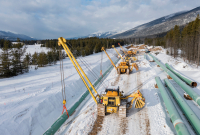Canada’s six largest banks quietly financed the $10-billion loan to Trans Mountain that was secured only after Finance Canada guaranteed taxpayers would pick up the tab should anything go wrong.
Finance Canada has repeatedly refused to disclose who is behind the massive loan to the contentious, publicly owned oilsands pipeline. However, data obtained from a Bloomberg Terminal on Monday and reviewed by Canada’s National Observer shows TD, RBC, CIBC, BMO, Scotiabank and the National Bank of Canada are all listed as lenders.
Guaranteed returns on a loan that size are a pretty sweet deal. Even if Trans Mountain fails to pay back the entire amount, the federal government’s promise means there is no risk of losing money for the banks involved. The exact amount loaned by each bank was not disclosed, however, if the $10 billion was shared equally, each bank would have put in $1.67 billion, representing the upper end of Canadian banks’ lending to fossil fuel companies in recent years.
The deal was inked on April 29 — the same day the federal loan guarantee was approved by Prime Minister Justin Trudeau’s cabinet, as first reported by Politico. It matures in one year, and TD serves as the lead co-ordinator.
Stand.earth climate finance director Richard Brooks said those dates aligning shows “the federal cabinet approval was a rubber stamp.” Moreover, a $10-billion loan co-ordinated across six banks is a complex deal that would have been in the works for months, raising questions about Finance Canada’s transparency, Brooks said.
“Why is this deal being hidden from the Canadian public?” he said. “Particularly because this is a publicly owned Crown corporation, and it's being financed in part by taxpayer dollars, and so there should be an intense level of transparency, not this type of opaqueness.”
Brooks said he believes the secrecy comes from the department’s determination to build the pipeline even though there aren’t credible arguments in favour of doing so.
“If this was a robust, guaranteed-to-be-profitable, guaranteed-to-be-climate-safe, not an Indigenous-rights-violating project, then we would be having Finance Canada and the Canadian banks shouting this out from the rooftops,” he said.
“But because it's a boondoggle from a financial standpoint, because it's literally a carbon bomb that's being built across the mountains, because it is a project that is violating Indigenous rights and goes against all the climate science, including the International Energy Agency and their modelling around what we need to do to reach net-zero emissions and keep temperatures under 2 C, nobody is proud of this project.
“That's why there's this level of secrecy where you have to pull teeth to get information and go through proprietary financial terminals to be able to access just the most basic information about who is supporting this project and to what degree.”
Brooks also said it was revealing that only Canadian financial institutions got in on the deal.
"That's really a testament to how tar sands and tar sands infrastructure, like this pipeline, are perceived by non-Canadian financial institutions," he said. "And also what the financial assessment is of those other institutions in regards to this project."
As thoroughly documented by Canada’s National Observer, the business case for the Trans Mountain pipeline expansion has been shattered by a series of cost overruns. To find a profit, experts expect the company would have to raise tolls on the pipeline. Charging producers this higher fee would make the oil too expensive to compete in international markets, experts say, effectively undermining its entire purpose.
Moreover, to attract private lenders like the big Canadian banks, experts say the federal government would likely have to subordinate its debt, meaning private-sector financiers will be paid first if the project is completed and earns revenue. That effectively means the Canadian public is unlikely to see returns on the billions it has already sunk into the project.
Finance Canada did not return a request for comment by deadline. Scotiabank declined to comment. RBC, TD, BMO, CIBC and the National Bank of Canada did not return requests for comment.






Comments
Feds purchasing TMX was a futile attempt to appease Wexit'ers. A lot of good that did since they ended up outside Parliament with posters threatening death on the PM for 3 weeks.
The Liberal Govt's support for the O&G industry and TMX in particular has little or nothing to do with appeasing Western separatist sentiment. This is a profound misreading.
Liberal support for the oilpatch has nothing to do with winning seats in Alberta or staying in power. Trudeau does not need to win votes from Alberta or seats in Saskatchewan to win federal elections. Conservative premiers do not sit opposite Trudeau in the House of Commons. Liberal victories depend on Atlantic Canada, Central Canada, and the Lower Mainland. Votes from the Prairie provinces not required.
The Liberals have nothing to gain electorally by pandering to intransigent Albertans and the oilpatch. In recent elections, a majority of Canadian voters have voted for parties other than Conservative. In 2015, Trudeau handily won a majority government with a strong mandate from voters on climate action.
The neo-Liberals serve Corporate Canada and the Big Banks, heavily invested in the oilsands. It is these entities and not conservative premiers that dictate the Liberals' energy/climate policies.
Corporate Canada is banking on fossil fuel expansion and climate action failure. The Liberal Party is Corporate Canada's front office.
As detailed by author Donald Gutstein, the Liberals' plan to fail on climate was set in motion long ago.
"The Rise and Fall of Trudeau's 'Grand Bargain' on Climate"
https://thetyee.ca/Analysis/2018/11/14/Trudeau-Climate-Bargain/
"Justin Trudeau's grand bargain with Big Oil exposed in Donald Gutstein's The Big Stall" (The Georgia Straight, Nov 14th, 2018 )
https://www.straight.com/news/1164161/justin-trudeaus-grand-bargain-big…
>> Liberal victories depend on Atlantic Canada, Central Canada, and the Lower Mainland. <<
___________________________________________________________________
While mathematically true, it hasn't been as cut & dried in competitive ridings,
In Vancouver Granville the results of the 2021 election were:
Lib: 33.8%
NDP: 33.7%
Con: 26.7%
Greens -- too low to matter.
It is hoped that a similar proportion holds for the next election and strategic social democratic voters can go back home to the NDP. But being three years away that is not at all guaranteed.
In 2015 it was no contest for the Libs because Trudeau was a fresh faced kid espousing all the right rhetoric with a popular and very qualified candidate in the riding. Even so, just one week before the vote the NDP and Cons were gaining, but Jody Wilson Raybould pulled out ahead in the last few days, propelled by a very deep dislike for Harper and thousands of strategic voters who wanted him gone.
The Greens ran a paper candidate as a ballot placeholder, but in actual fact the Green office staff helped out JWR / Libs. That was very odd.
In 2019, the NDP were far behind and the Cons were neck-and-neck with the Libs. By then JWR was kicked out of the LPC but still won the riding as an Independent, receiving a sympathy vote. In 2021 she left politics and the Libs ran a controversial candidate who won a squeaker.
All of this leads to the conclusion that voting in such ridings is very complicated and difficult for progressives, a place where cold math triumphs over principles on shifting ground. The Cons still have the potential to win if the progressive vote is split, but that is hopefully diluted enough now with a demographic where renters, youth and progressive aging Boomers now outnumber the wealthy and right-wing suburban ideologues.
Even so, should the Cons win government one day by a slim minority of ridings with Vancouver Granville painfully being one of them, we will all suffer through a complete dismantling of almost every climate policy concurrent with cancelling funding for childcare, healthcare, public transit, social justice initiatives and so on at the same time as giving even more ludicrous tax breaks and subsidies to Big Oil while eliminating environmental review "red tape."
There is the distinct possibility that the NDP can now win Vancouver Granville. But then again, they'd be a part of a federal party that still needs to answer for holding Trudeau up by the seat of his pants, golden pipeline and all.
If you live in a strong, one party riding where no other party ever wins, you can be excused for not understanding the complexities of diverse urban ridings where it's a genuine and often very tight competition, where voting on principle could see the worst possible of outcomes through hard numbers alone.
But one should never point fingers from single-party ridings and blame others for voting strategically for their secondary choices to prevent the ultimate political disaster with a party orders-of-magnitude worse than Trudeau's by adding their terribly damaging social agenda on top of everything else.
Alex's post does not refute the fact that Liberal victories depend on Atlantic Canada, Central Canada, and the Lower Mainland. The Liberals do not have to win any seats in Alberta and Saskatchewan to win elections.
Alex's long and winding comment has nothing to do with my post. He misconstrues my comment utterly.
Instead, he seems to be rehashing his justification for voting Liberal (i.e., for climate failure) in Vancouver Granville election after election. Different topic.
On that score, the Liberals and AB and BC NDP have proved far more effective than the Conservatives in delivering on Big Oil's and Corporate Canada's agenda.
The only way out of the impasse is to give the Liberals a time-out. Alex will not hear of it.
If Alex wishes to go over the climate cliff under a Liberal, nominally progressive banner than a Conservative flag, so be it. He plans to vote for climate failure until the end of time. No solutions on offer.
Too bad.
"“If this was a robust, guaranteed-to-be-profitable, guaranteed-to-be-climate-safe, not an Indigenous-rights-violating project, then we would be having Finance Canada and the Canadian banks shouting this out from the rooftops,” he said."
Not to put too find a point on it, if this were "a robust, guaranteed-to-be-profitable, guaranteed-to-be-climate-safe" and upheld indigenous peoples' rights" then there would be no issue with financing. Frankly, if it ever had the possibility of being profitable, Kinder Morgan wouldn't have dropped it like a hot potato.
TMX is heading for stranded asset status with every debt payment, every announcement by carmakers on their catalyzed ramp up to electric vehicles, the incremental removal of blockages in the battery and microchip supply chains, and the lack of bitumen supply contracts in Asia.